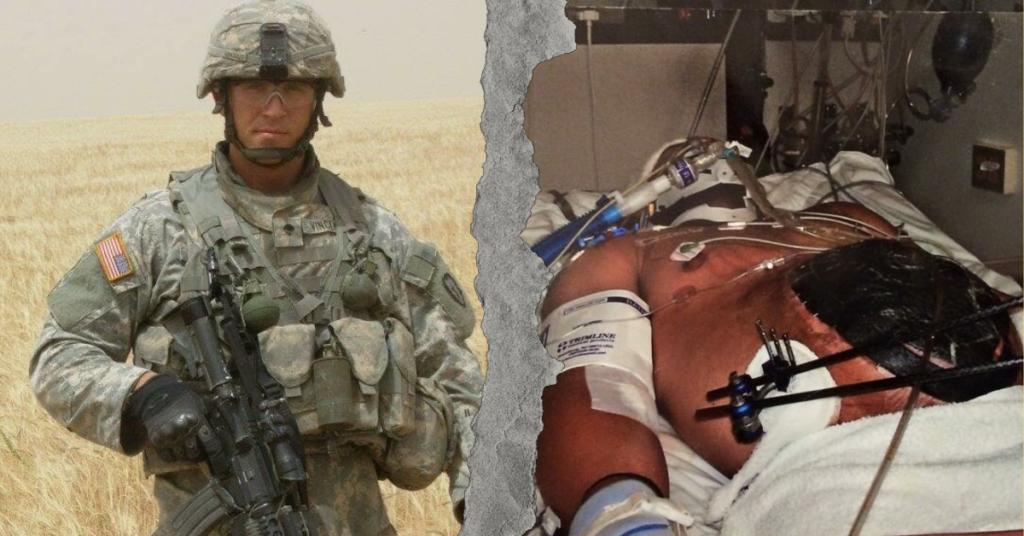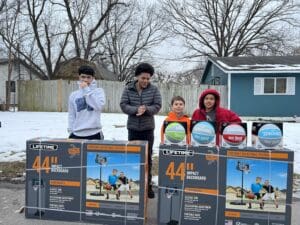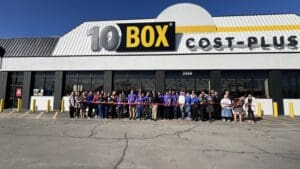“I’m not the same person I was when I left. I’m just not. I’m a completely different person.”
Shane Vincent is a husband, father of three, and a war hero.
Before he was twenty years old, he was racing BMX bikes—racing and winning. A lot.
“BMX was my life, man. It was my identity. It was how people knew me,” he says.
Vincent spent years on the BMX circuit and got to be good enough that he was set to be a legitimate contender for the Olympics when BMX was to be added in 2008.
But Shane Vincent had another stirring in his heart. After watching the Twin Towers fall in September of 2001, Vincent decided he would put his BMX dreams on hold to serve his country in a different way by joining the Army.
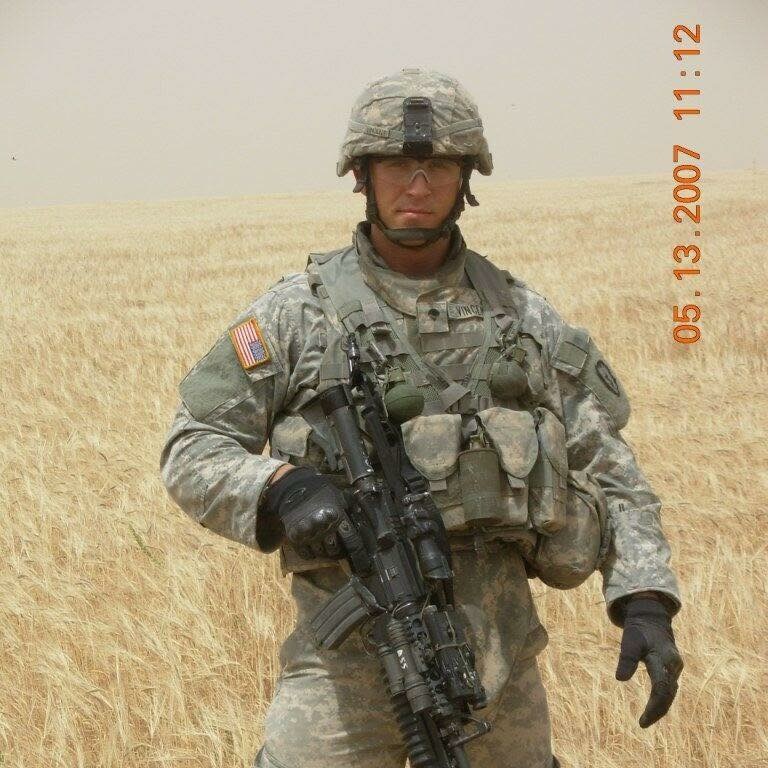
It began to look like that sacrifice was going to be well worth it, as the Army had instituted a program to help him achieve that dream of getting to the Olympics.
“It looked like God was putting everything into place,” he said; to him, it appeared that laying down his dreams of being an Olympic-level racer for the time being was going to pay off in a big way. He applied to the program, but before he got an answer, he was told he’d need to put his dreams on hold again, at least for a little while.
“They told me ‘you’re going to deploy, we need you to deploy,’ so I said, ‘no problem, I’ll go do my tour and I’ll go do that after.'”
Shane said that being in Iraq was eerie at times. “I would get this feeling, like, ‘I’m not going to come back from this mission.’ All I could do was pray about it. I still had my job to do.”
He said the prayers helped. “Man, if people really understood the power of prayer,” he said. “I had so many people praying over me…I know that’s why I’m alive today.”
A devout Christian, Shane said he never went on a mission without his bible. “Did I always read it as much as I should’ve? Probably not, but I never went on a mission without it.”
On May 24th, 2007, Shane’s Cavalry troop was on its way back from a routine mission when it tripped a wire connected to a roadside bomb. They later told him that the bomb was likely meant for a tank, for all the explosives it contained. “The guy behind me said it launched our truck 100 feet in the air,” he said.
As the fiery, mangled scrap of metal that was their Humvee came crashing down to the earth, the rest of Vincent’s group moved into action.
“They thought I was dead at first,” he said. They moved on to check on everyone else and found the explosion had killed Vincent’s good friend, a gunner, who had been sitting right next to him.
Sergeant Martin had been in the Humvee when the explosion occurred. He later told The Sapulpa Herald that the only things that survived that blast were himself, Shane, and Shane’s bible.
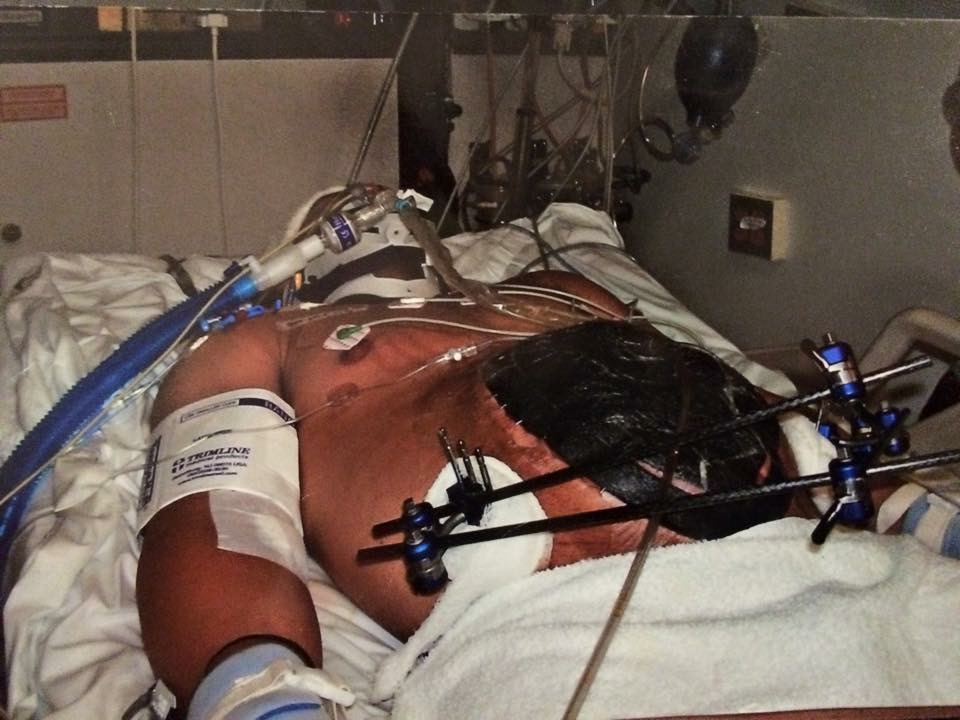
“He’ll never walk again”
“He’ll be lucky if he lives, but he’ll never walk again. He also has a severe traumatic brain injury. If he wakes up, he might be brain dead.”
The words from the doctors hung in the air of the medical center in Germany as 22-year-old Shane Vincent lay in bed with a broken neck, back, jaw and pelvis.
The Sapulpa-born-and-bred Olympic hopeful who had put his dreams on hold to go serve his country was now barely clinging to life, and if he lived, it sounded like it wasn’t going to be much of one.
His wife Sharon recalls what it was like getting that dreaded phone call. “We were only a couple of months away from being together again,” she said. “I was making arrangements for him to come back to the base in Hawaii. I was home alone and got that call I thought it was more like a bad dream.”
She didn’t know it at the time, but when the Army arranged for him to be transferred to the military hospital in Germany, they weren’t expecting him to leave there alive. “Germany is a worst-case scenario. It’s where you go so they can make you comfortable,” she said.
Shane says when he woke up, he was confused and disoriented. He has no memory of the explosion or anything in the weeks following while he was in a medically-induced coma.
“I was stuttering, looking at him and trying to talk, wanting to speak but I couldn’t get the words out,” he says. I was confused, thinking, where am I? I was just in Iraq, but now I’m in a hospital and no idea why.”
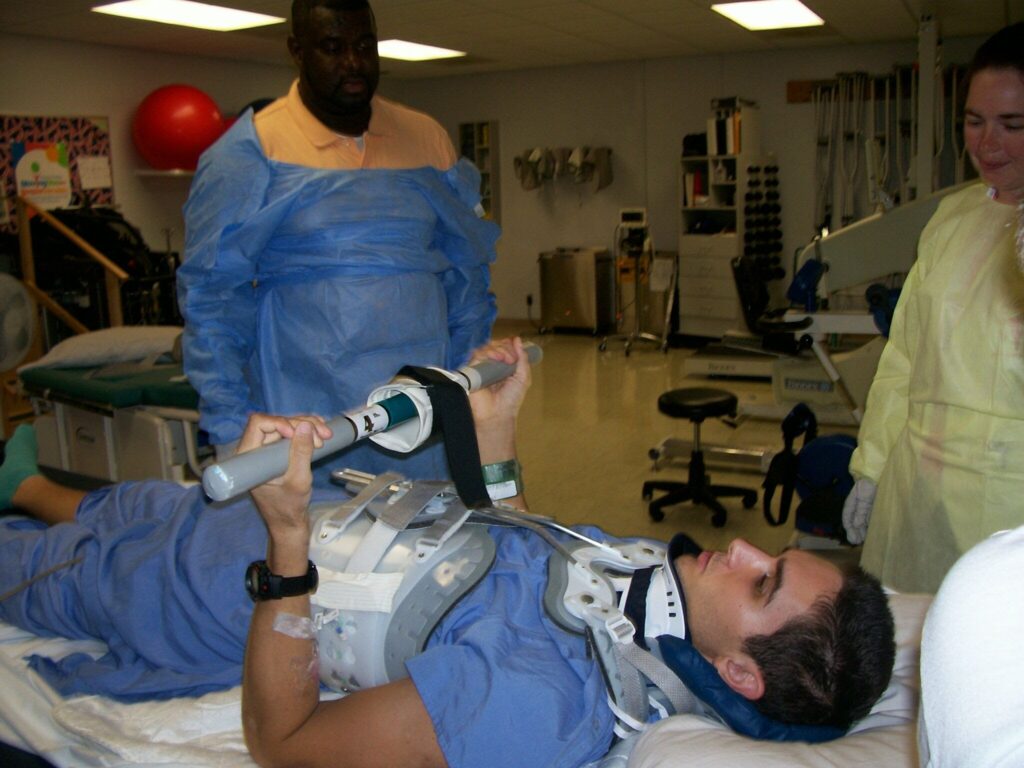
Shane remained in the hospital for as long as he was deployed—ten and a half months. During that time, he not only had to learn how to walk again (defying doctors’ expectations), but he said the recovery caused him to question his own faith; he learned later that he’d been accepted into the program the Army was going to send him on to train for the Olympics. His acceptance came just a week after his injury.
“I’d have done a full deployment, and then I would’ve been over in Fort Carson, Colorado, racing BMX and training for the Olympics,” he said. “I was already hurting. I wasn’t the same person physically or mentally, but finding that out was like I’d lost my identity.”
“His joy was gone”
The realization that he’d never get to live out his dreams in the Olympics, coupled with the PTSD and survivor’s guilt drove Shane into a deep pit of depression, even after he got to go home.
“You could see that his joy was gone,” Sharon says. “There was a deep sadness in his eyes. You would think that everything was going to be better at home, but it was harder. He would isolate himself and be very quiet.
“I’d get frustrated with him, saying, ‘you’re home! You’re safe, you’re surrounded by people who love you, why can’t you see that?’ but that is us on the outside looking in,” she said. “You could tell that he was carrying such a heavy load and trying to do it all on his own.”
The severity of Shane’s injuries meant he was constantly in pain. Sleep was a luxury he was rarely given. The only relief he found was in pain pills. Soon, he found himself addicted to them.
The Vincents were told that they’d never be able to have children, so when Sharon turned up pregnant with their first, boy, she was overjoyed, but nervous, too. Having a baby under normal circumstances was difficult enough. What would this experience be like?
Shane was so involved with his own trauma that the prospect of being a father didn’t initially have much of an effect on him. “I was so, so selfish,” he said. “I was so focused on my own pain that I wasn’t thinking about how it was affecting the people around me.”
The deep pit of despair lasted for years. During this time, Shane began going to the gym again, and he found a convenient distraction from the internal anguish and constant pain he endured. But even that came with its problems: “I was doing good, getting in shape, but it was keeping me away from a family that needed me,” he said. He says that sometimes he would overdo it and injure himself, forcing him to sit out for days or weeks. During those times, the depression would hit the hardest.
An Incredibly Dark Place
The years of PTSD, constant depression, and lack of sleep, now coupled with the additional guilt of feeling like he’d never measure up as the husband and father he should’ve been led Shane to an incredibly dark place.
“When you’re dealing with PTSD, traumatic brain injury, depression, anxiety, anything can set you off, right? Nobody’s fault, it just happens,” Shane said. “I got in an argument with my wife, I got in my car and put a gun to my head.”
At that moment, Shane and Sharon’s 7-year-old son walked out into the garage. Shane said the moment he saw his son, something clicked in his brain. “I thought, What are you doing? I realized, what if my son had come out a moment later and seen me? And now he’ll think, ‘my dad went through all this, and killed himself?’ And then he has to live with that for the rest of his life. I don’t want to do that.”
Sharon says that she realized that it would take a miracle from God to save her husband, so she began to pray earnestly for him. “I surrendered that to Him,” she said, “and I watched as God began to work on Shane.”
Shane said after his near-suicidal incident, he checked himself into Laureate Mental Hospital. “It was hard to do,” he said. “In the Army, you’re taught to be tough, so you want to be tough and handle it. But being there, I had to get off all medication.” It turned out to be a good thing. “My mind began to clear up, and I began to think, maybe I’m here because of God. I’m not a quadriplegic. I’m not a paraplegic. I’m not brain-dead. I have kids. My wife is still with me.”
Purpose In The Pain
It wasn’t an easy process, but slowly, Shane began to smile again. He found joy in being a husband and a father who was present. He says it’s all because of God and his wife. “God gave me an amazing wife, who struggled through this with me. Without her, I wouldn’t be here today,” he said.
Shane has since started a non-profit dedicated to helping veterans get fit physically, mentally, and spiritually. His wife says he draws on his own dark experiences to help coach other veterans through their issues. “He doesn’t want anyone to live like that,” she says. “He wants to encourage people and to have them know that they can be restored.”
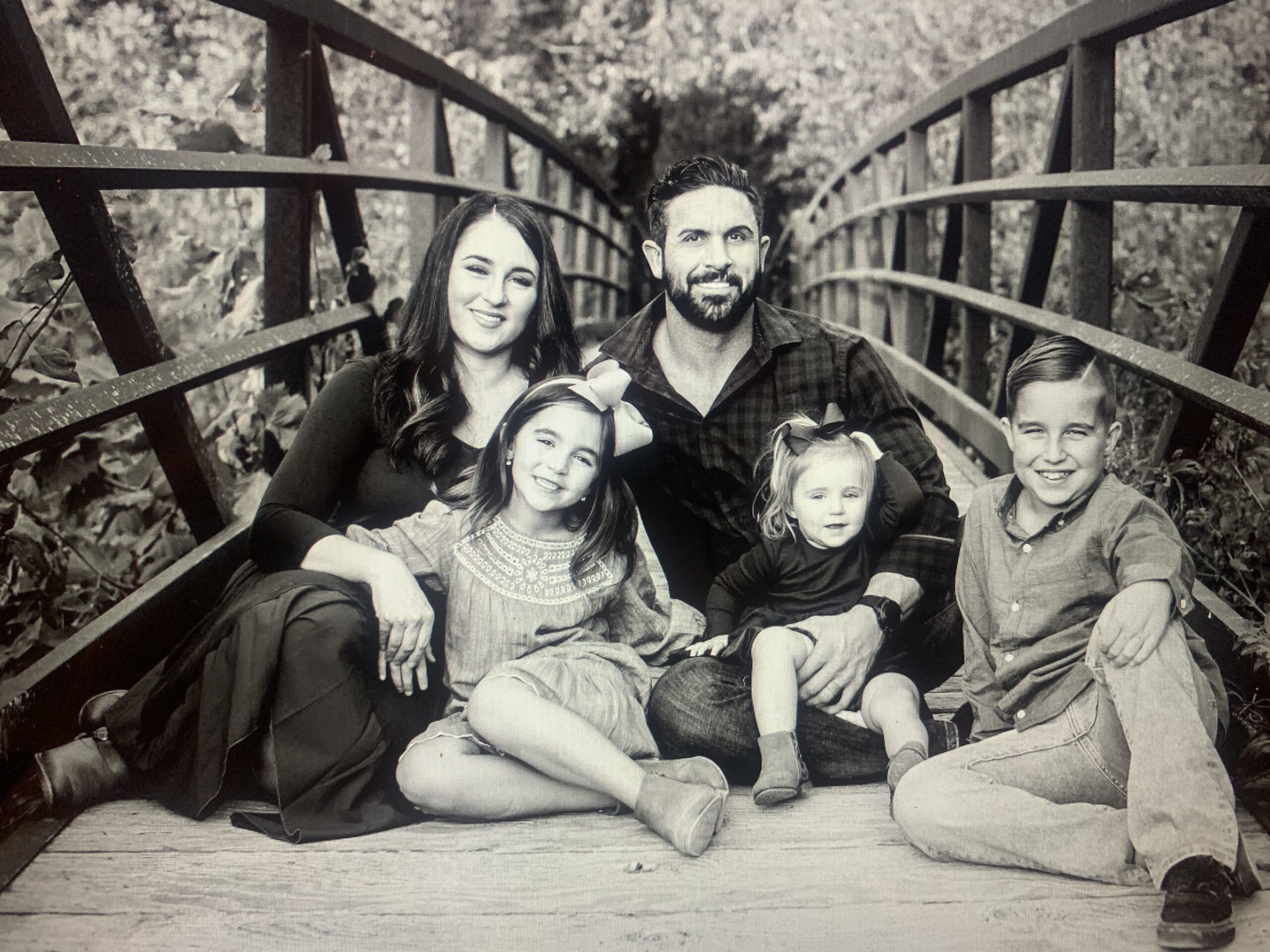
Shane and Sharon now have three children and are committed to helping other injured soldiers—and their spouses—find new life after injury. They say the important thing is to know that the journey is worth it. “Things are still going to be hard,” Sharon says, “but there’s purpose in that hurt and that pain.”
If you’d like to hear more about Shane’s story, he’ll be speaking at The Way Church, on Sunday, June 19th at 9:30 AM and 11 AM.

